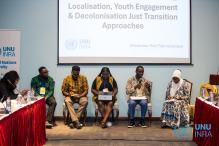Introduction
NEXtra, or “Resource Nexus for Sustainability Transformations” offers opportunities to conduct doctoral studies under joint supervision by experts from TU Dresden, UNU-FLORES and IOER. Under the EPOS (development-oriented postgraduate studies) funding programme, German Academic Exchange Service (DAAD) will support doctoral candidates from the Global South. From 2023 until 2030, we expect annual intakes of approximately 7 to 8 scholarship-funded candidates. A unique feature is that all candidates and supervisors will be connected to the UN system, an approach that is facilitated by regular consultations with the United Nations Development Cooperation Office (UN-DCO) in New York.
Scope of the Programme
Students from the Global South and with different disciplinary backgrounds will work on sustainability transformations using a Resource Nexus perspective.
The focus of the programme is on interlinkages between environmental resources, and synergies and tradeoffs in their management.
Doctoral students are expected to turn into “agents of transformation” who will contribute towards sustainable development in their home regions and beyond.
Scholarships, Applications and Deadlines
Approximately 7 to 8 scholarships for doctoral candidates from the Global South will be available annually, starting from 2023. The call for applications is typically announced each year around February/ March. For the most up-to-date information, please visit our website: https://careers.unu.edu
Required documents
If you consider an application to NEXtra, you may already prepare the following documents.
Completed and signed EPOS Checklist: epos_checklist.pdf (daad.de) (including all documents listed)
In addition to all the documents detailed in the EPOS checklist, please provide the following:
Research proposal (max 13,000 characters including spaces, plus references) with the following sections: a) Background and motivation; b) State of the art and current scientific discussion; c) Research approach and methodology; d) Work plan; e) References.
Abstract of your Master thesis (max 1 page)
Reference letter from your academic supervisor, on official letterhead and signature.
Copy of high school/ secondary school certificate
Proof of internships (if any)
Two cohorts are with us
In the first cohort, students from India, Malawi, Myanmar, Sudan and Thailand have joined us, working on sustainabability transformations in South and Southeast Asia as well as Southern Africa and the Sahel. Topics include the management of mangrove forests, urban human-nature partnerships, drivers and implications of land cover change, and the application of an extended cost-benefit approach for evaluating climate change adaptation and mitigation measures.
In the second cohort, we have recently welcomed students from Egypt, India and Tunisia, and doctoral candidates from Bangladesh, Belize, India and the Philippines are expected to join us later this year.
Contact
If you have questions or would like to know more about this doctoral programme, please contact the programme coordination by email: nextra@unu.edu
Funding
This project is funded by German Academic Exchange Service (DAAD).





